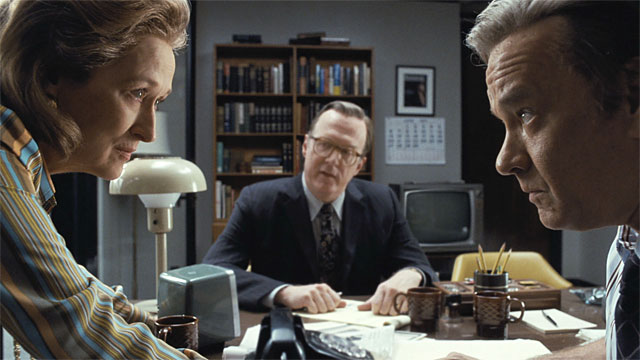Post on 'The Post'

“The Post” is a movie that could not miss being a winner. Not with Steven Spielberg directing two of the best actors of our time—Tom Hanks and Meryl Streep. It doesn’t hurt that the story is an important piece of journalism history, and part of a genre ennobled by a classic—“All The President’s Men.”
Aside from its artistic value, what we appreciate about this film is its timing. It makes every serious journalist, especially newspaper people, proud of their calling. It validates, almost to the point of glorification, a profession that has been shamefully attacked by that miscreant in the White House, whose actions have been affirmed by the scummiest of his political associates and by that paragon of fake news called Fox News.
As journalism history, critics have observed that the film gives too much credit to The Washington Post for exposing the Pentagon Papers, somewhat downplaying The New York Times, which owned that story and won a Pulitzer Prize for its work. Nonetheless, it is excellent drama and should do for the Pentagon Papers what “All the President’s Men” did for Watergate.
The latter film appeared shortly after Watergate took down a president, yet until the movie brought it all to life, a lot of people had difficulty understanding what all the fuss was about. To many, it seemed like just another political dirty trick gone wrong. The Pentagon Papers incident pre-dated Watergate and for most people it was also a vague affair, relating to a war that people just wanted out of, anyway we could.
But it was hardly a unanimous sentiment. Many of us had been through years of brainwashing, going back to the French defeat in North Vietnam in 1954, afraid that if South Vietnam went Communist, all of Southeast Asia would soon follow. The “domino effect” was a concept people could grasp. It was easier to understand than a nationalist movement, which was affecting countries that had enjoyed European civilization for hundreds of years. It was inconceivable in the early 1970s that one day American veterans would return to Vietnam as tourists and be warmly greeted by those who once tried to kill them.
The Pentagon Papers are more readily understood with the perspective of four decades and the reality of a war that has been brought home numerous times in books and films such as “The Deer Hunter,” “Platoon” and “Apocalypse Now” and its memory hardened in granite on the National Mall. That wall is a reminder of an afternoon in 1969 in a cemetery just outside Philadelphia when an honor guard of his friends, still in uniform, lowered Lenny Martin to his grave, and the sun suddenly burst through on a day that had been wet and gloomy.
What Daniel Ellsberg revealed when he leaked the Pentagon Papers is that Lenny Martin and more than 50,000 others had died in vain and that the government suspected it all along. In that respect “The Post” goes a bridge too far. It lumps four presidents, going back to Eisenhower, as sort of conspirators who deceived the American people on the reality of that war. That is unfair to at least one. Although he initially sent in American forces as military advisors, President Kennedy was on record as a young senator in the 1950s to the effect that European colonies, such as the one France had, were doomed. As president, he had begun to realize that further military involvement was a mistake. After the Bay of Pigs disaster in 1961 and the tension of the Cuban Missile Crisis a year later, he had lost confidence in the CIA and some of our highest-ranking military men. He told confidants that he planned to withdraw from Vietnam after he won re-election. He also angered the military-industrial establishment by reaching out to the Soviet Union in an effort to end the Cold War.
As with the Pentagon Papers, time can be history’s clarifier, and it is increasingly clear that John F. Kennedy was one more casualty of Vietnam
Image via
